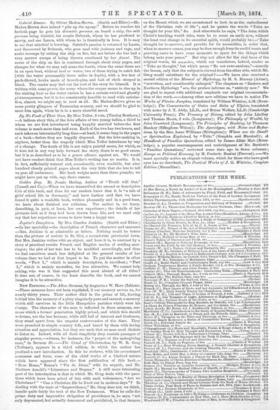NEW EDMON8. — The Alton Sermons, by Augusta a W. Hare (Isbister.
—These sermons have not been reprinted, if our memory serves us, for nearly thirty years. Their author died in the prime of life, leaving behind him the memory of a piety singularly pure and earnest, a memory which still survives in the little Hampshire parishes which were his charge. The character of the man is reflected in these sermons, ser- mons which a former generation highly prized, and which this should welcome, not the less because, while still full of interest and freshness, they stand apart from the unquiet controversies of the time. They were preached to simple country folk, and heard by them with loving attention and appreciation, but they are such that no man need disdain to listen to. Indeed, with all their simplicity they contain passages of singular power,—witness, for instance, the "prayer of the unforgiving man," in Sermon 38.—The Creed of Christendom, by W. R. Greg (Triibner), appears in a third edition, to which the author has prefixed a new introduction. In this he reviews, with his accustomed acuteness and force, some of the chief works of a kindred nature which have appeared since the first publication of this book,— Ecoe Homo," Renan's "Vie do Jtsus," with its sequels, and Mr. Matthew Arnold's "Literature and Dogma." A still more interesting part of the introduction is that in which Mr. Greg deals with the ques- tions which have been asked of late with such vehemence, "Are we Christians?" "Can a Christian life be lived out in modern days"? In dealing with the topic of "Improvidence," Mr. Greg does not, we think, handle quite fairly the text of the New Testament. What he calls the prime duty and imperative obligation of providence is, ho says, "not only deprecated, but actually denounced and prohibited, in that Sermon on the Mount which we are accustomed to look to as the embodiment of the Christian rule of life "; and he quotes the words "Take no thought for your life," em. And afterwards he says, "The form which Christ's teaching would take, were he to come on earth now, without the least real change in its essential spirit, would probably be :—' Take thought for to-morrow, and provide for its necessities, in order that, when to-morrow comes, you may be free enough from its sordid wants and gnawing cares to have somo moments to spare for the things which belong unto your peace." But why not allow for the real force of the original words, mil pipiavavs, which our translators, indeed, render as "Take no thought," but which mean "Be not over-anxious,"—exactly the lesson, only that the subject is viewed from the other side, which Mr. Greg would substitute for the original ?—We have also received a second edition of the Manual of Mythology, by H. S. Murray (Asher), "rewritten, and considerably enlarged." The chapters on "Eastern and Northern Mythology " are, the preface informs us, "entirely new." We are glad to repeat with additional emphasis our original recommends- tion of the work.—Among other new editions we have to notice The Works of Flavius Tosephus, translated by William Winston, A.M. (Rout- ledge); The Commentaries of Gains and Rules of Ulpian, translated with notes by J. T. Abdy, LL.D., and Bryan Walker, LL.D. (Cambridge University Press); The Treasury of Botany, edited by John Lindley and Thomas Moore, 2 vols. (Longmans); The Philosophy of Wealth, by John Crawford (Longmans); The Principles of Banking, by Thomson Hankey (Effingham Wilson); The Apocalypse, with Notes and Reflec- tions, by the Rev. Isaac Williams (Rivingtons); Where are the Dead? or Spiritualism Explained, by "Fritz" (Simpkin and Marshall); A Handbook of b'amiliar Quotations, edited by James Allan Mair (Rout- ledge), a popular rearrangement and reabridgment of Mr. Bartlett's "Familiar Quotations," reviewed some time ago in these columns ; Essays on Political Economy; by M. Frederic Bastiat (Provost). —We must specially notice an elegant volume, which for those who have good eyes has no drawback, The Poetical Works of J. G. Whittier, Complete Edition (Macmillan).


































 Previous page
Previous page